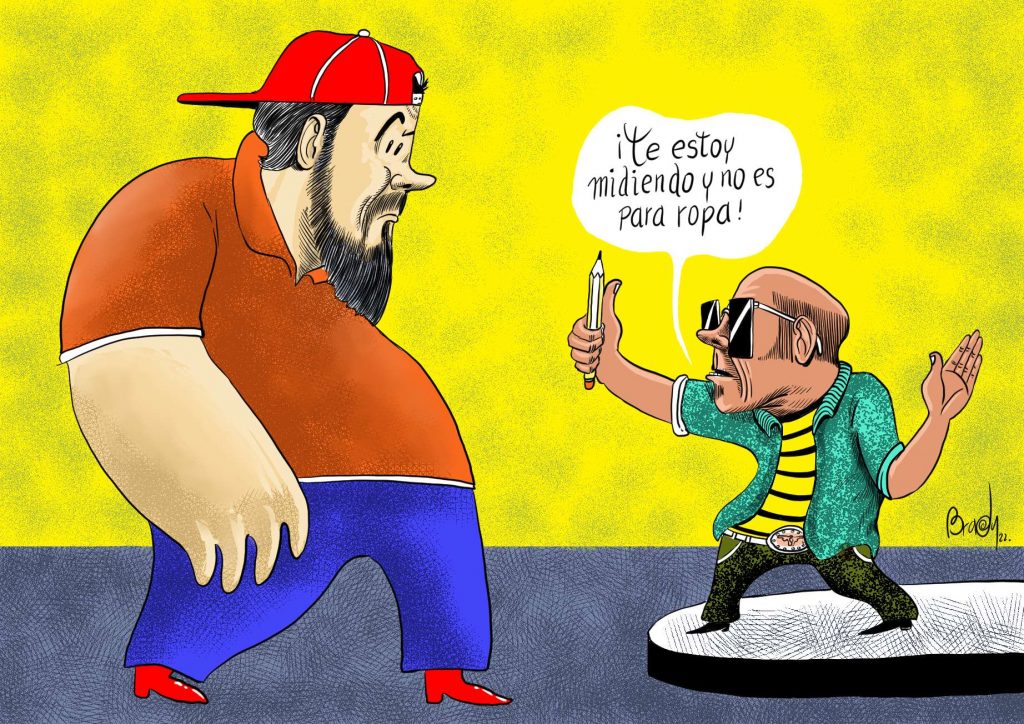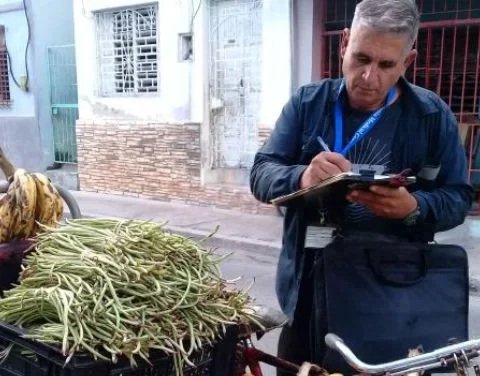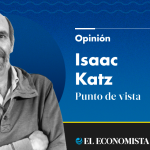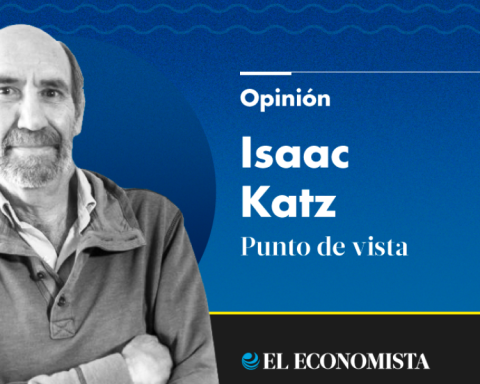As it happens with that phrase so ours, measuring is not always an exact science in Cuba nor does it have to refer to the very act of taking measurements, calibrating height, weight, thickness, depth. It is even curious how the terms traditionally used as lexical resources to establish measures come to mean something else, such as “going long”, “a big problem”, “she got short”, “a disservice”, “being a great one”, among other unusual semantic extensions.
But today we are interested in concentrating on those creative uses of language that make available to speakers very diverse and rich ways to refer to quantities, distances, magnitude…
Formulations preceded by the indeterminate “un” have become very common among us, which evidently tends to reinforce the approximate character of what is intended to be measured by quantities. Some refer to a small amount of something. We have classics like “una pinzca” or “una pizquita”, with very Cuban derivations like “un tinguaro”, “un tin” or “un tilín”.
Little is served when it is “a god”; it is taken with caution or a “buche” of rum is offered in solidarity; while “un buchito” is used almost exclusively for coffee (although for a long time it was also known as “el buchito” for that mouthwash that was distributed in elementary schools as a preventive treatment for oral health).
More numerous are the formulations for larger quantities, which gradually take gradations according to the communicative situation and are also usually more polysemic. “A fist”, for example, can refer to the quantity of a specific thing (“take a fist of salt to the broth”) but also to people (“bring a fist of people to work”). “Puñao” is also usually combined with “burujón” to form the funny quantity that is equivalent to a “burujón-puñao”.
On the other hand, “a bundle” usually expresses an excessive quantity: “they brought me a bundle of things”, “there is a tremendous amount of people in the pharmacy”, etc.
Since we are so fond of excesses and linguistic overabundance, there are several expressions that try to describe excess. Among them, the sisters “un pingal” and “un cojonal” stand out, who measure the same things, as distances, as time lapses: “a pingal/cojonal of breads ate”, “I had to walk a pingal/cojonal of blocks” , “they gave him a pingal/cojonal of years for stealing.” If you want to further reinforce the excess, then add the morpheme “re” which can also be combined with the particle “si”: “un recojonal”, “un repingal”, “un resipingal”.
Equivalent to much, in any context, are also “una bola”, “una pila”, “una tonga” (“un tongal” and “un tongón”), “un seremillal” (the latter with a very marked superlative degree) .
In the same family of the indefinite numerous we find the peculiar units of measurement that can constitute “a sack” (he gave a tremendous sack of legs), “a truck” (a truck of tamales was jammed) or “a town” (there was a town of people in line).
In the case of “a town” it is a very curious formulation due to the highly polysemic nature of the word, which evokes not only a large human group, but also the physical location of a locality. In this sense, town is equivalent to the numerous, but it is also a reference for measuring distances, physical or metaphorical. In this last variant, we find phrases such as “you passed a pile of towns” (for those who go too far) or “from there to there there is no more town” (when something is the maximum expression of an issue and cannot be overcome).
Another interesting use is the case of measurements that express a defined value, in numerals, for example, but that acquire an approximate quality with use, either for large quantities (“there were a million people”, “I have 100 thousand problems on top of me” , “he fell and turned a thousand times”) or for a few (“there are only two or three people”, “there are four cats left in the classroom”, “let me take a five” —or “a ten”—). Nor is it exactly a month that you need to wait when someone tells you to “hold on for a month”.
Lastly, in this group related by the “un”, we find two recently created measurement units, as they have been incorporated into our public imagination in recent years: a “cucumber” and a “yutong”. The “cucumber” refers to the container for soft drinks or water with a capacity of one and a half liters, while the “yutong” (which takes the name borrowed from the buses of the Chinese company Yutong that are used for interprovincial transport in Cuba) refers to the one-liter bottle of rum. Thus, we can find in everyday communication expressions that are difficult to understand by another Spanish speaker such as “I bought you an oil cucumber” or “we are going to have a yutong on the boardwalk.”
Another possible formulation and with widespread use among us, is one that is articulated by the “with” and a modifier that usually expresses the quality or intensity of what is measured: I love you “with cojones”, that is far away “with dick” , they gave him “with desire”, yours is “with pain”.
We have variants to refer to what is far away (“that’s at the dick’s house”, “I had to go to the house of hell”, “he lives in the house of the quimbambas”, “I went to buy it in remangalatuerca”, “it’s where the devil gave the three voices”), and what is nearby (“right there-mismitic”, “when turning”, “sticky“, “to the chant of a rooster”, “where I see you”, “within reach of the hand…”).
To characterize the one who is tall (“a fork stick”) or the one who is short (“a stopper”); the one who is fat (“tonina”, “bayoya”, “tanque”, “bola”, “totomollo”, “masaboba”, “fofo”, “buti”) and the one who is skinny (“güin”, “fleje” , “pestillo”, “enclenque”, “fringe”, “consumptive”, “chupao”, “sardina”, “pelo de segueta”, “damage“, “wrong encavao”, “findingo”). We measure the depth “by eye of a good cubero” to certify if “you give footing” or not, if someone can bathe “in the deep” or “in the short”.
Likewise, we make fun of what is slow and takes “a century”, of those who “give themselves tremendous sandpaper” and never finish getting ready or putting themselves together to go out. To that kind of people, in my native Pinar del Río, we always said: “He has tremendous pasta!”.
However, it may be that fast or fast makes us happy at times (“I went out fuming”, “I was going to screw up”) but many of our phrases to express or measure that notion are useful in both positive and negative actions.
“In the twinkling of an eye” a problem can be solved or a fortune lost; “catch an eyelash” is irrelevant at home, somewhat problematic at work and fatal if you are driving; Although it refers to space, many wrongs are solved in “a room of earth”; It is very good if a matter is “killed” in “two-by-three”, but not if it refers to a love affair. And it can be bad or good, depending on the reader’s judgment, to advance quickly in reading a text, since the author does not know, after the final evaluation, if it was pleasant or not if he receives as a judgment: “I read it in nothing” . If today you read the text “en na´”, but you liked it a lot, or “a stack”, I consider myself paid.

















